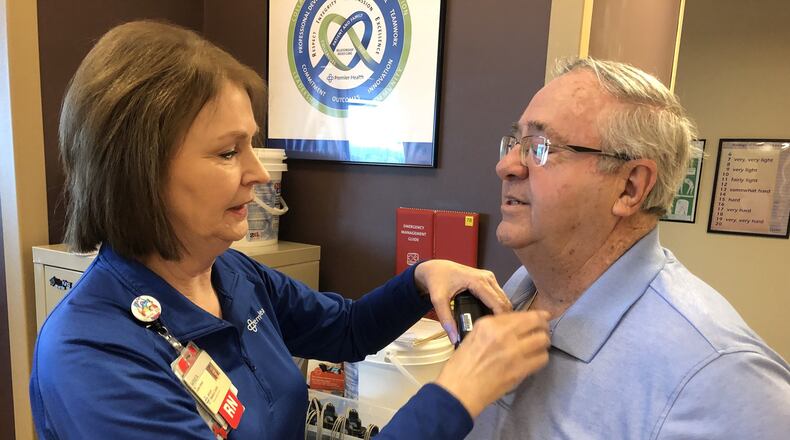Ten years ago, he received the inevitable news that comes with being a Gibson. He had heart disease, the same tract that impacted his father and five brothers. In fact, one of his younger brothers required a heart transplant before he was 50.
If there’s such a thing, Fred Edward Gibson is one of the lucky Gibson men. He only needed five-bypass open-heart surgery, and his healthy lifestyle delayed his heart disease until he was 68.
“You are what your family is,” said Gibson, 78.
Unlike his relatives in Virginia, where smokin’ and drinkin’ are part of life, Gibson abstained from those habits, giving him “some additional years,” he said.
MORE McCRABB: McCrabb: Black History Month time for education, reflection
Now Gibson, a former advertising salesman at the Middletown Journal and later publisher of Brown Publishing, credits the Cardiac Rehabilitation Unit at Atrium Medical Center for extending and improving his quality of life. Ever since the open-heart surgery, Gibson has been a regular in the rehab unit, exercising one hour every Monday, Wednesday and Friday mornings. When he walks in, those in the unit should welcome him like Norm on Cheers.
After his workouts, Gibson sits with the other patients during what he calls “social hour.” Although they range from 30 to 80 years old with diverse backgrounds, they share a common bond: Bad hearts.
“We are family here,” he said. “We are trying to extend our lives.”
He was one of the first to have open-heart surgery at Atrium Medical Center, which replaced Middletown Regional Hospital in 2007. Open-heart surgery was one of the services added when the hospital moved from off Central Avenue to the East End.
Gibson said his wife, Carolyn, noticed he appeared tired and his lips were pale after he returned home from his daily walk 10 years ago.
MORE McCRABB: Repeated vandalism has Hamilton urban garden facing ‘tough decisions’
“There is something wrong,” she said.
He was examined by Dr. Gary Brown, his cardiologist who immediately sent him to Atrium. Four days later, on May 24, 2010, Dr. Thomas Merle, a surgeon at Kettering Medical Center who was assisting Atrium with its new cardiac unit, performed the open-heart surgery.
“I was so blessed,” Gibson said.
Then a few months later, while returning from having dinner with his wife, two daughters and grandchildren in Dayton, Gibson said he “didn’t feel right.” His daughters called Atrium and Dr. Brown was still at the hospital. He met the Gibsons in the emergency room and placed a temporary pacemaker.
MORE McCRABB: McCrabb: Church community responds to shocking death of bus driver
“My whole world opened up,” he said.
The next day, Gibson had a placement of a permanent pacemaker and defibrillator. He was a new man.
“Right back on my feet,” he said.
That’s when he started his cardiac rehab program and he never has left. He could exercise at the YMCA, where he once was a board member, or at a local fitness center, but he prefers the unit at Atrium.
He said the experienced staff there cares for him physically, mentally and emotionally.
“There is a safety net here,” he said of the medical staff that performs tests before he exercises. “They take care of all your needs. It’s not a body-building place. It’s a quality of life place. They are healing souls and spirits, not just hearts. When you get a close look at death, you need your spirit cared for as much as your physical heart. ”
Without the rehab unit, he simply said: “I wouldn’t be here today.”
About the Author

